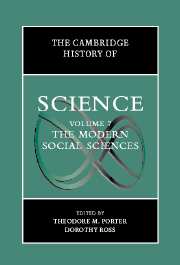Book contents
- Frontmatter
- 1 Introduction: Writing the History of Social Science
- PART I SCIENCES OF THE SOCIAL TO THE LATE NINETEENTH CENTURY
- PART II THE DISCIPLINES IN WESTERN EUROPE AND NORTH AMERICA SINCE ABOUT 1880
- PART III THE INTERNATIONALIZATION OF THE SOCIAL SCIENCES
- PART IV SOCIAL SCIENCE AS DISCOURSE AND PRACTICE IN PUBLIC AND PRIVATE LIFE
- Index
- References
1 - Introduction: Writing the History of Social Science
Published online by Cambridge University Press: 28 March 2008
- Frontmatter
- 1 Introduction: Writing the History of Social Science
- PART I SCIENCES OF THE SOCIAL TO THE LATE NINETEENTH CENTURY
- PART II THE DISCIPLINES IN WESTERN EUROPE AND NORTH AMERICA SINCE ABOUT 1880
- PART III THE INTERNATIONALIZATION OF THE SOCIAL SCIENCES
- PART IV SOCIAL SCIENCE AS DISCOURSE AND PRACTICE IN PUBLIC AND PRIVATE LIFE
- Index
- References
Summary
How do we write the history of social science? There are problems even with the name. In English alone, “sciences of man,” “moral sciences,” “moral and political sciences,” “behavioral sciences,” and “human sciences” have been among its many predecessors and competitors. Their proliferation reflects the unsettled nature of this broad subject matter. All are capable of giving offense, both by exclusion and by inclusion. Many have long and contradictory histories.
Consider the career of the “moral sciences.” The phrase “sciences morales et politiques” was introduced in France about 1770. In 1795 it was enshrined as the official label for the “second class” of the Institut de France (the former Académie des Sciences was the first class), until this nest of critics was reorganized out of existence by Napoleon in 1803. Restored in 1832, the official institution of the moral and political sciences was now suitably conservative, emphasizing philosophy and individual morality. John Stuart Mill, an admirer of Auguste Comte’s “sociology,” included in his enduringly influential 1843 treatise on logic a section aiming to “remedy” the “backward state of the moral sciences” by “applying to them the methods of physical science, duly extended and generalized.” A German translation of Mill’s work rendered “moral sciences” as Geisteswissenschaften – not the first use of that German term, but an influential one. It referred to the sciences of Geist, which could be translated back into English as “spirit” or “mind.” In German, this remained a standard label until well into the twentieth century. It was understood to indicate that such studies had a moral and spiritual character, quite unlike the sciences of nature.
- Type
- Chapter
- Information
- The Cambridge History of Science , pp. 1 - 10Publisher: Cambridge University PressPrint publication year: 2003
References
- 5
- Cited by



